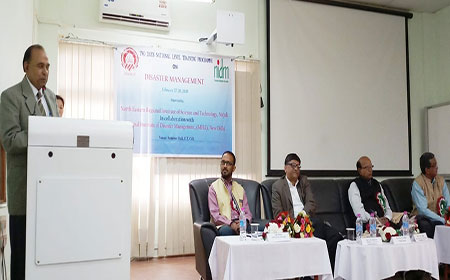Staff Reporter
NIRJULI, Feb 27: “Engineering students of NERIST should contribute in the field of research and development (R&D) by designing new equipment and creating structures which are resilient, in order to mitigate the impact of disasters,” said Itanagar-based 12th Bn NDRF Commandant UK Thapliyal, addressing the inaugural function of a two-day national level training programme on disaster management which began at the North Eastern Regional Institute of Science & Technology (NERIST) here on Thursday.
The programme is jointly organized by the NERIST and the National Institute of Disaster Management (NIDM), New Delhi.
Highlighting the role of research and development in mitigating disaster impact, Thapliyal said that, as an institute for research and development, the NERIST should encourage engineering students to design equipment which would help the NDRF in its operations.
Elaborating the impact of various disasters, Thapliyal said, “Whenever a disaster strikes, communication setups are the first things that are severely affected; hence, focus should be on ensuring that communication is restored at the earliest after a disaster. Research and development should focus more on preventing communication setups from damage during disasters.”
Underscoring the importance of disaster preparedness, he advised parents to teach their children about what they can do during any natural disaster to save their lives.
Thapliyal cited hesitance among people from sharing resources and holding back of information as the biggest hindrances in disaster management, and advised all to make sure that they share information with the agency concerned in order to mitigate the impact of disasters.
“Through the training, the NDRF team strives to make the students aware about the dynamics of our work and explain to them about how disaster management policies or training skills are implemented,” he said.
Earlier, the chairman of the NERIST’s chief engineering department’s technical & advisory committee, Prof SK Singh, spoke on various pre- and post-disaster measures which can be adopted to ensure minimum loss of lives and properties.
He stressed the need for imparting rescue operation training to the locals, “so that they can provide much-needed assistance to maximum people during any disaster.”
The programme’s coordinator, Prof S Mishra, spoke about “the need for the engineers to come up with better structure designs which will eventually help in minimizing disasters, as poor structures often lead to disasters.”
NERIST Director, Prof HS Yadav, informed that the NERIST will soon sign an MoU with the NDRF and the state government for establishing an incubation centre and innovation.
“A fund of Rs 10 crore has already been sanctioned by the state government for the incubation centre and innovation, and it will soon be granted to the institute. The centre will be working particularly for the Northeast region,” he said, adding that the central government is “focusing to make sure that fruits of science and technology and its awareness and experience are made available to common people of the county.”
Anil Kathait from the NIDM also spoke.
An NDRF team showcased various search and rescue equipment during the training programme.



